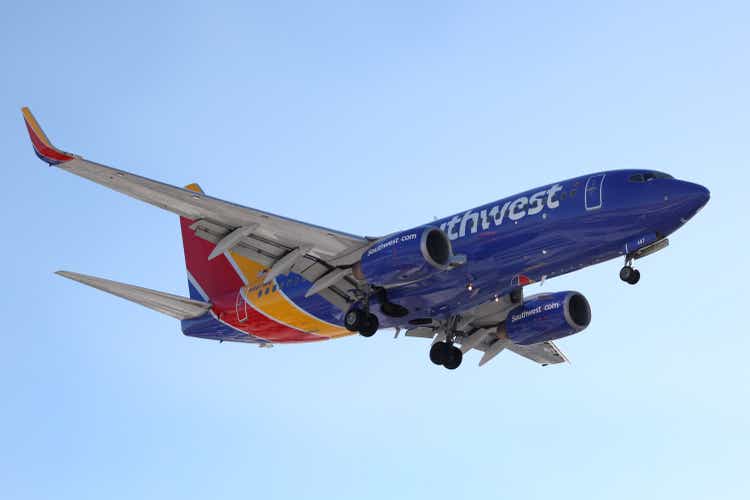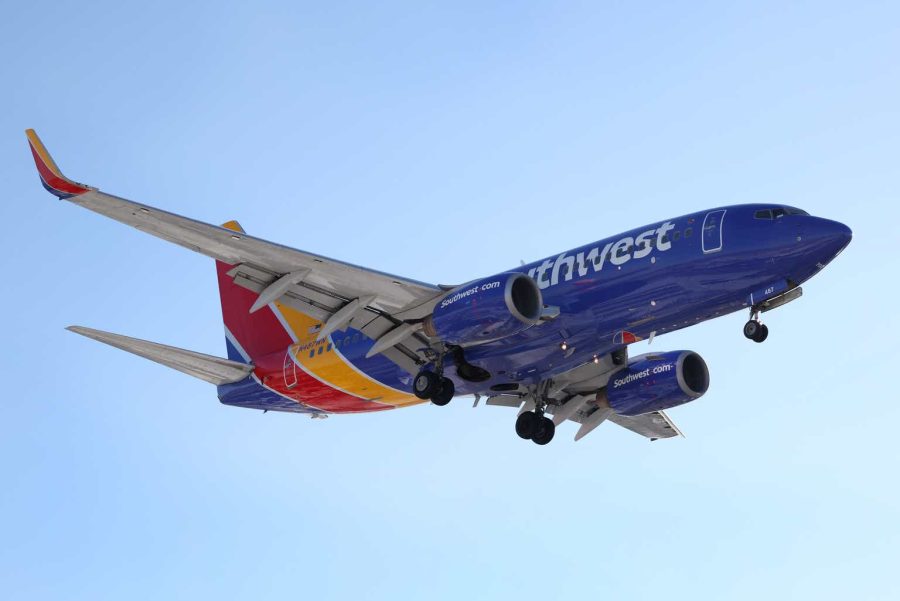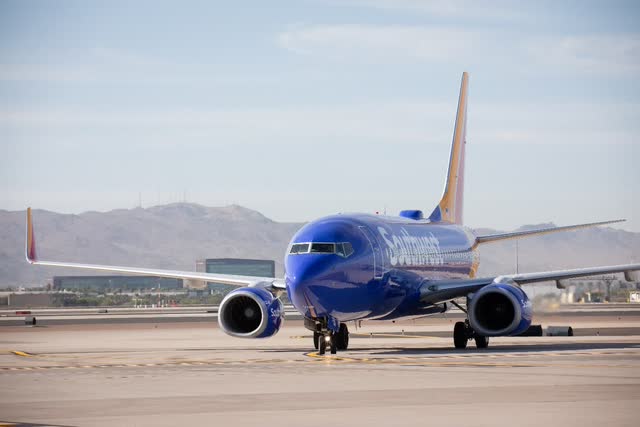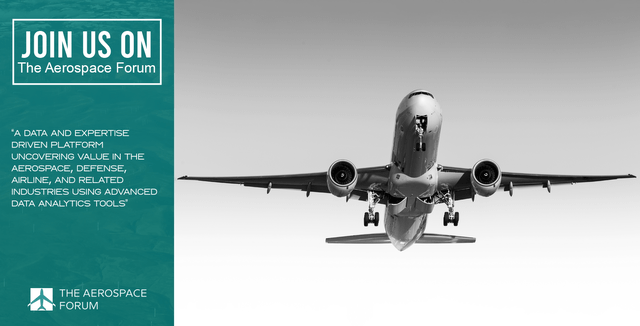Summary:
- A Southwest Airlines Pilots Association, or SWAPA, strike authorization vote was passed on 11 May.
- The SWAPA Union is misusing arguments for their vote, and this all appears just self-serving interest for higher pay.
- A summer strike would likely mess up the Southwest Airlines Co. financial performance for the entire year.
- A mass strike is not expected – if any strike even happens.
Scott Olson
Southwest Airlines Co. (NYSE:LUV) should be one of the airlines benefiting from the revival of air travel demand. The reality is somewhat different. The disruptions in December that hit Southwest Airlines harder than any other airline in some way has dented the public image of the airlines, and on the 11th of May, its pilots authorized a strike.
Why Are Southwest Airlines Pilots Authorizing A Strike?
The official reading is that for the strike authorization is as follows:
The lack of leadership and the unwillingness to address the failures of our organization have led us to this point. Our pilots are tired of apologizing to our passengers on behalf of a company that refuses to place its priorities on its internal and external customers.
SWAPA – Southwest Airlines Pilots Association – says the company has floated away from the values set forth by founder Herb Keller. Those that have read my coverage know that I am not a particularly big fan of the CEO, as he was tone-deaf throughout the meltdown of Southwest Airlines and even after that, simply denying the role technology played in the meltdown. I even said that I believe the CEO needs to pack his bags, but I believe that what SWAPA presents as reasons to authorize a strike is the romanticized version that they can sell easier to the flying public.
It’s All About The Money For Southwest Airlines!
While I am not denying that there are things that could be improved for Southwest Airlines making the job more pleasant and in fact safer, I believe the reality is that they are not really authorizing a strike because of the lack of leadership and the technology gaps at Southwest Airlines. They are blatantly misusing that element, which they weren’t vocal on prior to the December meltdown.
Looking throughout the industry, more unions are authorizing strikes, and more often than not it is about getting higher pay. If there is one thing I know, the pilots at other airlines are not calling strikes because they sympathize with the Southwest Airlines pilots or because of the technology problems there. They are simply authorizing a strike for higher pay, and so are Southwest Airlines pilots. The fact that negotiations between the union and Southwest Airlines have been ongoing for over three years says enough.
A Slap In The Face Of The Flying Public
When the pilot union called for the vote in May, they said it was to give travelers time to rebook. You could view this in several ways. The first one is that this is a slap in the face of travelers that still trust Southwest Airlines with their money and travel plans. Let’s not forget, though, that the pandemic airlines were kept afloat with money of the taxpayer, and jobs – including those of pilots – were secured with that money.
Pilots now authorize a strike, dangling a dagger above the travel plans of thousands and probably millions of people. This does absolutely nothing to help recover the trust in Southwest Airlines, even though the pilot union claims this is in the interest of passengers. This is self-interest wrapped in something that does not display the self-serving needs.
While pilots might have a good point in requesting salaries and conditions that fit the market, the reality is that pilots earn extremely good money. A pilot at Southwest Airlines receives between $50,000 and $200,000, depending on role and seniority and the estimated pay is over $100,000. The median income in the U.S. is $54,132 per year. So, indeed starting pilots don’t earn a big amount, but as they gain experience they also earn more, which is the way it is everywhere, and pilots at the midpoint often make double the median of a U.S. salary. That should be food for thought, as SWAPA is authorizing a strike for higher pay over the backs of the average Joe who put his or her hard-earned money into a holiday trip.
Will A Strike Happen?
Most definitely, but if SWAPA would tell you this part of the story, the support for their plans would crumble pretty fast. That is why they wrap it in a “lack of leadership” story. If they wanted to make a change on a leadership level, doing it via loyal customers is most definitely the way to do it. SWAPA said by calling the vote early, travelers can arrange alternatives. There are two sides to this. By creating this panic among travelers, they are trying to deprive Southwest Airlines of revenues. Secondly, creating the notion that the travel plans will be disrupted is just fearmongering – and SWAPA knows it, too.
The SAV, or Strike Authorization Vote, is a first step towards a strike and is often used to put management on the edge to reach an agreement quickly and swiftly. It increases the leverage in negotiations. It is not the case that a vote happens and tomorrow the airline does not fly because pilots are striking. For that to happen, negotiations need to reach an impasse, after which mediation via the National Mediation Board can happen. That can lead to an agreement after all, and if that is not the case the White House and Congress can intervene during the 30-day cooling-off period in which a strike is not allowed. In November 2022, such an intervention did happen, preventing a rail strike.
So there are two things to keep in mind here. The first thing is that SWAPA did mischaracterize the strike as imminent, advising the travelers to alter travel plans. Secondly, they timed the vote not in the interest of the travelers. The vote was timed such that, before peak-travel season, pressure on Southwest management to reach an agreement would be increased, and if talks fall apart, the pilots can strike during peak-travel season, hitting travelers and Southwest Airlines the hardest. So, pilots are keeping travelers and the company they claim to value hostage in this situation, and they know that.
The reality is that a strike might happen, but chances are big it won’t happen. By authorizing a vote, SWAPA just sharpened the sword in time to hang it above the travelers and Southwest Airlines before peak-travel season. That is how negotiations work, but it certainly doesn’t win the beauty contest.
Conclusion: Southwest Airlines Kept Hostage By Pilots
I totally understand the right for unions to use the tools in their toolbox, and I advocate better compensation and conditions. However, SWAPA is misusing the December disruptions to force an agreement on negotiations that have been ongoing for three years, and most of it really centers on higher pay. Given that the pilots’ jobs were secured with government money funding, I think authorizing a strike is not ethical for the simple reason that if it weren’t for the taxpayers that they are willing to dupe during peak travel season, they wouldn’t have a job, and they didn’t have to strike in the first place.
If a strike happens during the summer, it will financially ruin Southwest’s entire year, and that is also why its stock price is not rebounding. SWAPA undoubtedly knows all of this, and that is why the union does things this way. However, I would expect that before that happens, an agreement will be reached. Just for the time being, all stakeholders, not just shareholders, are affected by SWAPA’s campaign for higher pay, which they present as an effort to improve leadership and improve the operations only by threatening to disrupt those very same operations.
I continue to believe that a Southwest Airlines Co. agreement will be reached with the pilots before any strike happens. Even if any strikes do happen, they will likely be small, and an agreement can be reached before a full meltdown occurs.
Analyst’s Disclosure: I/we have no stock, option or similar derivative position in any of the companies mentioned, and no plans to initiate any such positions within the next 72 hours. I wrote this article myself, and it expresses my own opinions. I am not receiving compensation for it (other than from Seeking Alpha). I have no business relationship with any company whose stock is mentioned in this article.
Seeking Alpha’s Disclosure: Past performance is no guarantee of future results. No recommendation or advice is being given as to whether any investment is suitable for a particular investor. Any views or opinions expressed above may not reflect those of Seeking Alpha as a whole. Seeking Alpha is not a licensed securities dealer, broker or US investment adviser or investment bank. Our analysts are third party authors that include both professional investors and individual investors who may not be licensed or certified by any institute or regulatory body.
If you want full access to all our reports, data and investing ideas, join The Aerospace Forum for the #1 aerospace, defense and airline investment research service on Seeking Alpha, with access to evoX Data Analytics, our in-house developed data analytics platform.


